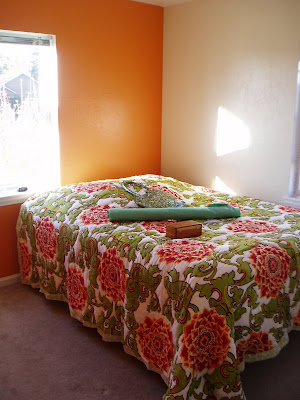I know a lot of people have made various edible cells and that would have been fun, but we made an almost edible plant cell using the directions found in Janet VanCleave's book Plants. She has loads of great ideas in her book and we did several of them, but not nearly as many as I planned due to unexpected craziness before Christmas.
Looking at examples of plant cells for their own diagram in the book World of Plants by Usborne. I highly recommend this book as a reference. The pictures were awesome and everything was laid out really neatly and well. This is one I want to buy for my own collection.
Harriet loved squishing the jello around. She turns three in February (how did this happen??) and she has decided, most firmly, that she can do all the school stuff the older kids do. I love her diagram. I also love the note she carefully wrote for me the other day; asking me to spell out all the words, followed by her carefully writing down each letter (no, they didn't look like letters but they looked lovely nonetheless). She also reads with me, which consists of her picking a book she has memorized and reading it to me by carefully moving her finger from one word to the next as she tells me the story. I love this age so much!
This kid is in the loud stage where he sounds like he is dying if everything isn't just exactly how he wants it. He's also started fighting against naps (he's five, but my kids all needed naps until then) for the first time. He used to tell me when it was nap time and then go lay down. I only have him nap about every third day, but that is pushing his capacity to cope. Today I made him lay down and he yelled and screamed like he was being eaten by cannibals and then slept like one of the dead for three hours and still went straight to sleep at his 7:30 bedtime. I might need to bump his nap schedule back to every other day. I swear motherhood is about carefully orchestrating everything just so to prevent and redirect and anticipate.
After we made our cells I broke out the microscope for the first time -- oohh, ahhh -- and the kiddos went nutso they loved it so much. I bought a set of pre-prepared slides so we looked at all the plant slides in the set. Unfortunately, the microscope had to be put away before the children wanted it to because I got tired of the jostling and muttering and open hostilities about whose turn it was and how long each turn had been and who was going next.
One highlight of the day for me was harassing my son, Cowen, about letting me poke him with something sharp so we could look at blood under the microscope. I had to niggle him a little about his masculinity being called into question if he refused. He couldn't let the girls be poked! That wouldn't be gentlemanly. He conceded the point about the girls readily enough and eventually said I could poke him (I didn't). I loved the manful squaring of the shoulders and sweet stoicism. I adore boys.
Random side note, if you have a man-child and haven't read Why Gender Matters by Leonard Sax, you should repent immediately and go read it. It is a really fantastic look at the actual physiological differences between boys and girls (way more than I ever dreamt) and some of the emotional/mental differences as well. When I taught education students at a local university, I always had them read this book.


























